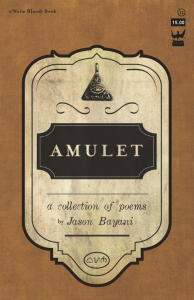Amulet by Jason Bayani | Write Bloody Publishing 2013 | $15.00

After a Jason Bayani poem, sometimes all you can say is, “Damn.” At 84 pages, Amulet may cause excessive cursing. And not just to God, but to other “thing[s] just out of reach” (45), all the hollering forged into an object that will protect us from harm. His hands both a curled fist and a prayer, Bayani waits . . . waits for this noise to take the shape of language.
Amulet‘s epigraph invokes Jose Garcia Villa and gestures toward the romantic brokenness and terrific terror of the poems to follow, which are birthed from a lineage of great Filipin@ American writers. I’m not one to go in for beauty in poetry, but damn, the way Bayani “remak[es] the line” (as he suggests in the opening poem to this collection) is beautiful. Consider the lines “Give me the petal that hits like a heavy brick” (35) or “My body is a projection of stone that remembers the mountain it ran away from” (76). Feel the tidal movement of the earth and of time in the line: “all this history in the open veil of your body, / this seed, this push, this silt, / how we been built by a blood procession of so many hands / pulling plough over poverty” (67). On the back cover, Barbara Jane Reyes says that “the language of Bayani’s poems pops and bangs, punches, hurls bricks, and then does not flinch from tenderness,” and I agree that there is a surprising vulnerability here that disarms as much as it reveals its own strength.
The weight of this book is in its silences, in the words “just out of reach,” as it contemplates the impact of silence among men of color when no one really teaches you “what to do with your hands” (75). The palms, then, and the mouth, become heavy weights. While Bayani knows that “A man’s ability to feel is overvalued in Art. / I’ve cashed in on it. / Every woman who loved me / hates me a little for that” (24), he also urges us to “Imagine we’re in a room, and everything in this room / has a mouth except for me. I feel that most days” (22). It is Bayani’s humor and grief made vulnerable, and the felt sense of the body “fall[ing] into a hard focus” (37), that makes us listen to the ringing in that place inside ourselves.
There is only so much room, and men demand
so much space. The violence doesn’t make you tough
like they said it would—just makes you quiet. [. . .]
Not having the words feels the same
as not having something to hit. (“Surrender the Body,” 41)~
All I ever really want to do with people,
is hug them or hit them. [. . .]
It’s what makes the most sense, when you
don’t know what to do with your hands. (“Troubador,” 75)
From the quiet, from the “thin slip of a place” (45) between the hug and the hit, emerges “want.” “Want” is returned to again and again in these poems. Bayani writes, “I know Want. / Its edges. How it pretends to be the hilt, then makes one of me” (72-3). He also knows that “Want will drive the rock into armor / as easily as it will clasp hands to prayer” (76). In “What Is This Thing Called Want,” Bayani moves from the pull of a romantic relationship, depression and addiction—to the birth of the speaker’s niece. He writes, “I watched the voiceless motion of her mouth reaching and pulling back and reaching. What I did not know then is that this is how children indicate their hunger” (49). Here, the baby’s hunger is communicated without words, through a silent motion of the mouth. This silent motion of the mouth is the reach of Amulet—each poem reaching, pulling back, reaching.
But Love hungers
like any hunger. The fight in it, the growling push and monster
of it, when what I’m trying to say is . . . what I’m trying to
say is . . . all of language is dead-ended.What is Love, then, but finding the right expression?
(“A Broken Crown of Sonnets for the End of the World,” 73)~
I don’t know what to do with myself most of the time.
It’s like I’m twelve again at the school dance,
and I’ve been practicing the running man all week.
And I’m standing there,
and I keep telling myself, “This ain’t the right song yet.”
And I know that I can do the running man,
My running man is hella fresh. And it’s never
the right song yet. Even when they’re playing Rob Base,
it ain’t the right song yet. And by the end of the night
everyone is slow dancing to Keith Sweat
and I’m doing the running man in front of the bathroom mirror.
(“Gristle,” 25)
In Amulet, series of sonnets sit next to dick and fart jokes. Laughter is an expression of grief—a whole lot of Filipinos camping, your father crying while watching a Bruce Willis movie. Bayani crafts the energy of his spoken word performances into the turns of sonnets and lines grounded by the push of breath in a vowel, and by the place where a word hits within the body. He writes, “We know terrible by the way it cuts // family lines and erases language until our words for God / and Love become unspeakable on our own tongues” (72). These poems crouch, waiting for the right song, trying to find the right expression. If there are no longer enough words for God or Love, perhaps we can start with just these two, or three, and from the dead-end, use our hands to reach for more.
One thought on “Review: Jason Bayani’s AMULET”